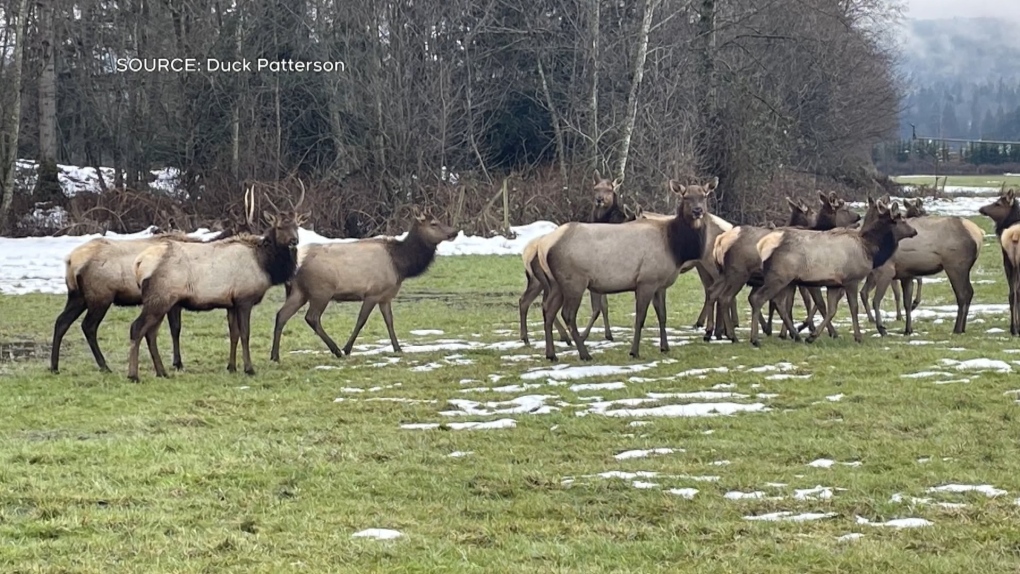Vancouver Island farmers struggle to deal with threatened elk species
 (Duck Patterson)
(Duck Patterson)
Farmers in the Cowichan Valley are losing crops and dealing with property and field damage caused by Roosevelt Elk, which have become a regular fixture on some farms in the area.
The threatened species typically moves to lower elevations during the winter months searching for more plentiful food, but in the last few years, in the Duncan area, some herds have been staying year-round on farmland.
In North Oyster, where Howie Davis has farmed cattle for more than 50 years, a herd of 12 elk showed up in December four years ago. Fortunately for him, they've so far always left by February or March.
"The herds are expanding every year," said Davis.
In the few months the elk are on the farm, Davis said they cause a lot of damage, knocking down fences, tearing the hay fields up with their hooves and eating whatever hay is growing over the winter "right down to nothing."
The elk damage to the hay fields has reduced the number of harvests from four to three in a season, said Davis.
"That’s one crop you don’t get to sell, less income," he said. "[The provincial government has] been compensating me for that … not to what it costs."
A University of Alberta research project intended to reduce human-elk conflict in the Cowichan Valley started in August 2021.
The team has set up multiple trail cameras in the valley to gather data on the herds' numbers and movements.
"To implement any sort of management strategies we need to have a good understanding of what’s happening with the population, how many are there, where are they on the landscape and how are they interacting with human infrastructure?" said Kate Rutherford, a masters student at the University of Alberta.
Rutherford says the provincial government has put a lot of effort into increasing the elk herds in the Cowichan Valley to create a healthy, sustainable population, which seems to have paid off.
"Everyone wants the population to be at healthy levels," she said.
"There’s also that balance, right, with maintaining a healthy population size but also minimizing the occurrence of human-elk conflict, which is going to increase as urbanization increases," she added.
Researchers are also planning to test deterrents to keep elk out of farms.
"We plan to broadcast predator vocalization on the perimeter of these fields where we’re currently monitoring elk using camera traps, and they will be broadcasted when triggered by animal movement," said Rutherford.
The team is also asking landowners in the area to contribute to their research by reporting elk sightings to them either through the iNaturalist app or by emailing the team directly at rooselk@ualberta.ca
The researchers hope to share their work with farmers and the provincial government as way to help with the management of Roosevelt Elk.
CTVNews.ca Top Stories

Second Cup closes Montreal franchise over hateful incident
Second Cup Café has closed one of its franchise locations in Montreal following allegations of hateful remarks and gestures made by the franchisee in a video that was widely circulated online during a pro-Palestinian protest on Thursday.
‘It’s pretty emotional:’ N.B. family escape fire, plan to rebuild home
A family in Riverview, N.B., is making plans for Christmas and the future after escaping a fire in their home on November, 14.
Cargo ship runs aground in St. Lawrence River near Morrisburg, Ont.
A large cargo ship remains stuck in the St. Lawrence River after running aground on Saturday afternoon.
Scurvy resurgence highlights issues of food insecurity in Canada's rural and remote areas
A disease often thought to only affect 18th century sailors is reemerging in Canada.
B.C. man awarded $800K in damages after being injured by defective bear banger
A B.C. man has been awarded nearly $800,000 in damages as compensation for injuries he sustained from a defective bear banger, according to a recent court decision.
A man called 911 for help during a home invasion. Las Vegas police fatally shot him
A Las Vegas man called for police help during a home invasion before an officer fatally shot him, according to authorities and 911 calls.
Cat caught in hunting snare rescued by BC SPCA
Donations are ramping up for a BC SPCA cat with a mangled paw after being caught in a hunting snare, one of a rising number of pets to fall prey to the hunting device.
These royal residences are opening their doors this Christmas
Not so long ago, if you wanted to spend Christmas with the royal family, the only way to get close was to press your nose up to the TV screen during the monarch’s Christmas speech.
'Still working full time on it:' One year later police continue to search for gunman in Caledon double murder linked to ex-Olympian
One year after a couple was shot and killed in their Caledon home in what investigators have described as a case of mistaken identity, Ontario Provincial Police say they are still trying to figure out who pulled the trigger.

































